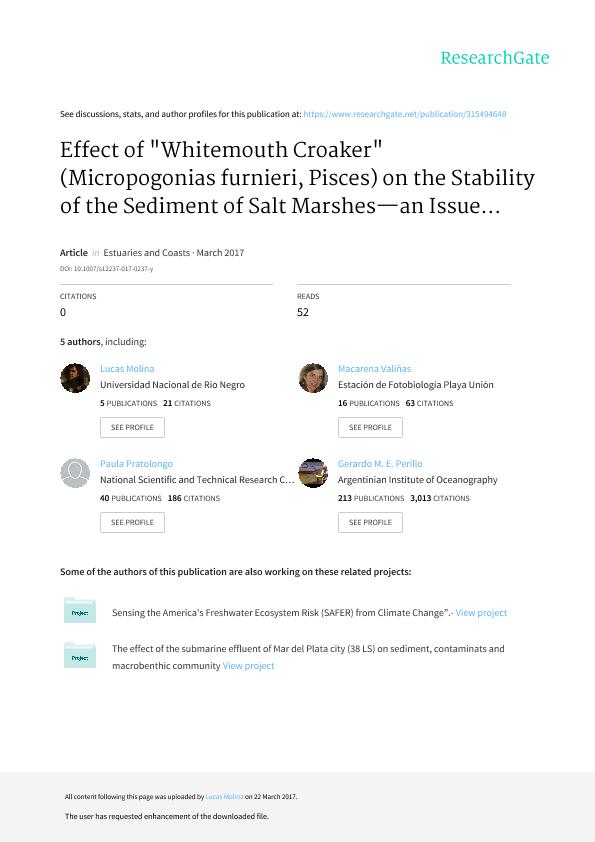Artículo
Effect of “Whitemouth Croaker” (Micropogonias furnieri, Pisces) on the Stability of the Sediment of Salt Marshes—an Issue To Be Resolved
Molina, Lucas Matías ; Valiñas, Macarena Soledad
; Valiñas, Macarena Soledad ; Pratolongo, Paula Daniela
; Pratolongo, Paula Daniela ; Elias, Rodolfo; Perillo, Gerardo Miguel E.
; Elias, Rodolfo; Perillo, Gerardo Miguel E.
 ; Valiñas, Macarena Soledad
; Valiñas, Macarena Soledad ; Pratolongo, Paula Daniela
; Pratolongo, Paula Daniela ; Elias, Rodolfo; Perillo, Gerardo Miguel E.
; Elias, Rodolfo; Perillo, Gerardo Miguel E.
Fecha de publicación:
03/2017
Editorial:
Springer
Revista:
Estuaries and Coasts
ISSN:
1559-2723
Idioma:
Inglés
Tipo de recurso:
Artículo publicado
Clasificación temática:
Resumen
Among the predators, fish are prevalent in intertidal soft-bottom zones, and many create substantial interruptions in the sediment surface through their feeding, thus affecting the movement of fluids in the sediment-water interface and therefore the rates of deposition and local erosion. This study was designed to determine whether or not Micropogonias furnieri—an ecologically significant benthophagic southwestern Atlantic Ocean predator—modified erosion and/or sedimentation processes in salt marshes. The results indicated that this species exhibited a preference for areas without vegetation cover at the time of feeding since a greater abundance of pits was found in those environments. Moreover, the volume analysis of the pits in the two areas indicated that the size of the fish that had foraged in the sediment was significantly larger in the nonvegetated areas. The results of the M. furnieri-exclusion experiment indicated that the presence of this sciaenid neither resulted in a decrease in benthic organisms in the nonvegetated areas nor affected the vertical distribution of the infauna. When M. furnieri was excluded, the sediment exhibited higher critical-shearing and frictional-velocity values than in areas where M. furnieri had access and therefore was less likely to be eroded. The data from these experiments enabled us to conclude that the foraging action of M. furnieri modified the stability of the sediment as a result of the predatory pressure that the fish exerted on the organisms inhabiting the salt marshes, thus resulting in the generation of elliptical depressions. That modification of the sediment stability was evidenced in two principal ways: (i) a negative effect on the microphytobenthic organisms that decreased the concentration of extracellular polymeric substances in the sediment and (ii) an increased roughness of the bottom and increased percentage of sand in the particle composition of the sediment, where the fish had foraged.
Archivos asociados
Licencia
Identificadores
Colecciones
Articulos(IADO)
Articulos de INST.ARG.DE OCEANOGRAFIA (I)
Articulos de INST.ARG.DE OCEANOGRAFIA (I)
Citación
Molina, Lucas Matías; Valiñas, Macarena Soledad; Pratolongo, Paula Daniela; Elias, Rodolfo; Perillo, Gerardo Miguel E.; Effect of “Whitemouth Croaker” (Micropogonias furnieri, Pisces) on the Stability of the Sediment of Salt Marshes—an Issue To Be Resolved; Springer; Estuaries and Coasts; 40; 6; 3-2017; 1795-1807
Compartir
Altmétricas



